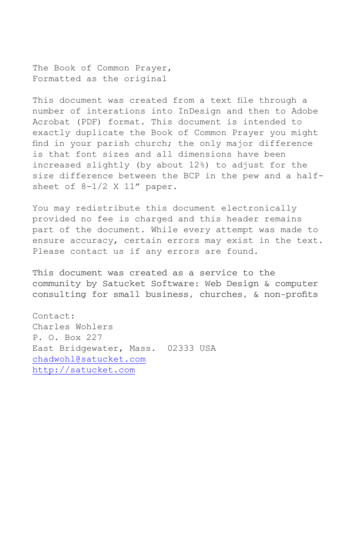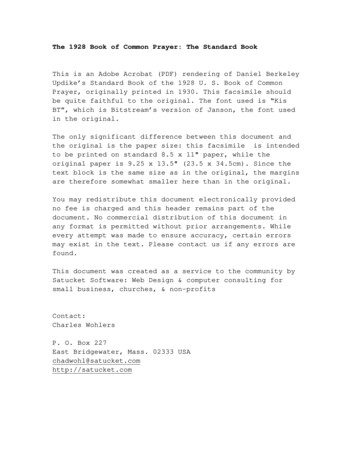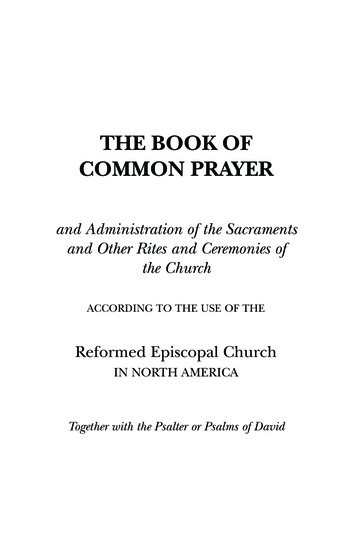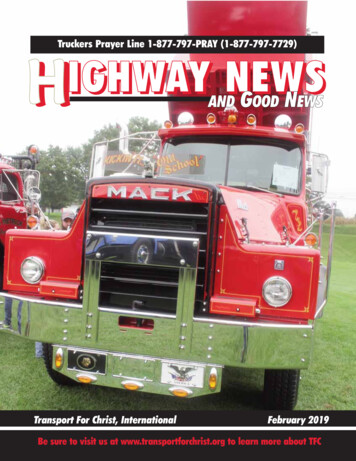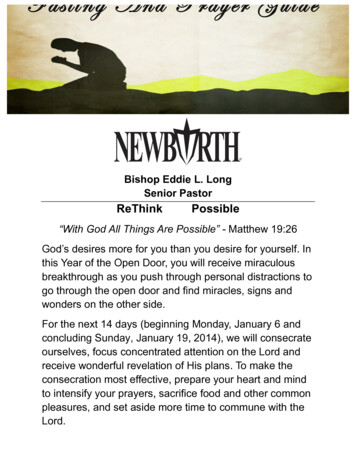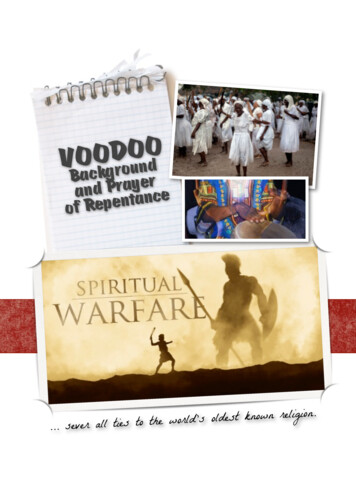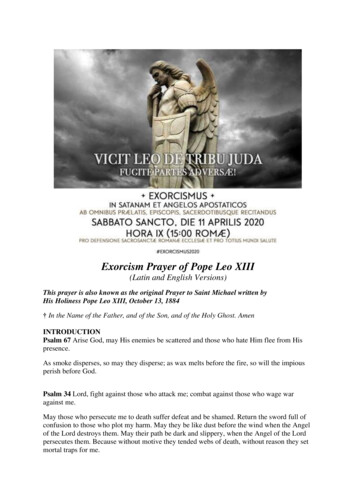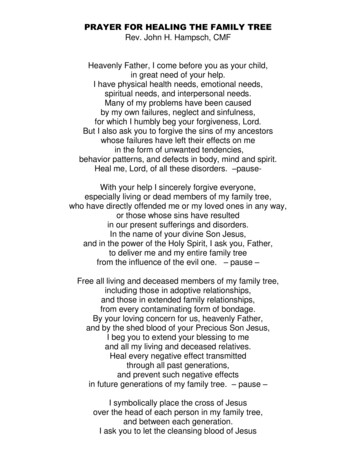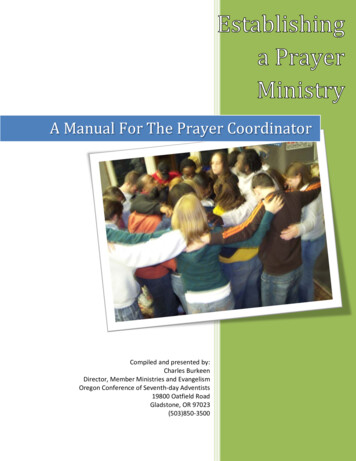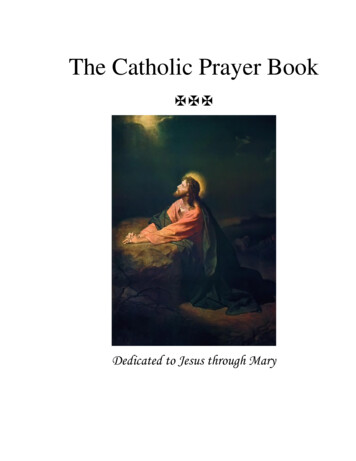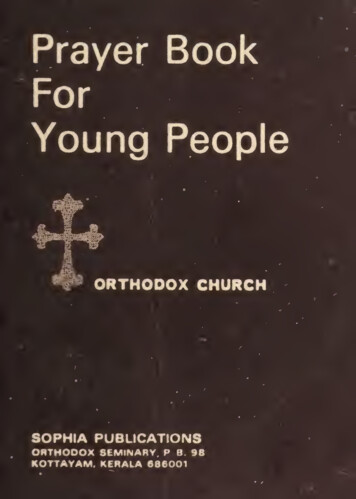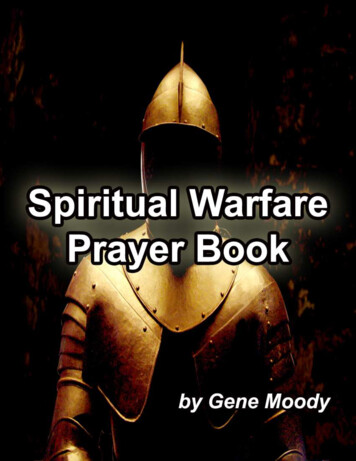
Transcription
the book ofcommon pray erandadministration of thesacramentswitho t h e r r i t e s an d c e r e mon ie s of t he c h ur c hAccording to the use of theanglican church in north americaTogether witht he cov e r dal e p s alt erTra di t i o n a l L a n g u a ge E di t io nan no d omin i 2021anglican liturgy press
the book of common prayer (2019)Copyright 2019 by the Anglican Church in North AmericaThe New Coverdale Psalter Copyright 2019 by the Anglican Church in North AmericaPublished byAnglican Liturgy Pressan imprint of Anglican House Media Ministry, Inc.16332 Wildfire CircleHuntington Beach, CA 92649Publication of the Book of Common Prayer (2019), including the New Coverdale Psalter, isauthorized by the College of Bishops of the Anglican Church in North America.All rights reserved. No part of this publication may be reproduced, stored in a retrievalsystem, or transmitted in any form by any means, electronic, mechanical, photocopy,recording, or otherwise, without the prior permission of the publisher, except as providedfor by USA copyright law, and except as indicated below for the incorporation of selections(liturgies) in bulletins or other materials for use in church worship services.Printed (I) Jun 2019, (II) Nov 2019, (III) Nov 2019Fourth printing, January 2020Quotations of Scripture in the Book of Common Prayer (2019) normally follow the ESV Bible (The Holy Bible, English Standard Version ) except for the Psalms, Canticles, andcitations marked with the symbol (T), which indicates traditional prayer book language. TheESV Bible copyright 2001 by Crossway, a publishing ministry of Good News Publishers.ESV Text Edition: 2016. The Holy Bible, English Standard Version , is adapted fromthe Revised Standard Version of the Bible, copyright Division of Christian Education ofthe National Council of the Churches of Christ in the U.S.A. All rights reserved. EnglishStandard Version, ESV, and the ESV logo are registered trademarks of Good NewsPublishers. Used by permission.Churches are encouraged to incorporate selections (liturgies) from the Book of CommonPrayer (2019), including the quotations from the ESV, in bulletins or other materials foruse in worship services. Permission requests for all other uses, including all commercial uses,must be directed to:Custodian of the Book of Common Prayer (2019), c/o Anglican Liturgy Press,Attn: Rights and Permissions, 16332 Wildfire Circle, Huntington Beach, CA 92649.ISBN 978-0-9979211-6-8 (Hardcover Clothbound Pew Edition)ISBN 978-1-7323448-4-6 (Deluxe Imitation-Leather Edition)ISBN 978-1-7334727-1-5 (Premium Calf Split Leather Edition)20 19 18 17 16 15 14 13 12 11 10 9 8 7 6 5 4 3 2 1
t a b l e of c o n t e n t sforeword preface 1concerning the divine service of the church 6concerning the traditional language edition 9daily officemorning prayer midday prayer evening prayer compline family prayer supplemental canticles for worship g r e a t l i ta n y & d e c a l o g u e113341576779great litany and supplication decalogue 92101holy eucharist: Anglican Standard Text holy eucharist: Renewed Ancient Text additional directions supplemental eucharistic texts 105123139holy euchar istseasonal greetings the exhortation offertory sentences proper prefaces 145147149152
bap t i s m & c on f i r m at ionholy baptism 161confirmation, reception, and reaffirmation 175baptism with confirmation 183renewal of baptismal vows 194past oral r i t e sholy matrimony 201thanksgiving for the birth or adoption of a child 2 15rites of healing reconciliation of penitents 223ministry to the sick 225communion of the sick 227additional prayers for the sick 231ministry to the dying 237prayers for a vigil 243burial of the dead 249t h e p s a lt e rselections of psalms psalms 1-150 e p i s c o pa l s e r v i c e sthe ordinal 269270472483497510institution of a rector 515consecration and dedication of a place of worship 5 25ordination of a deacon ordination of a priest ordination and consecration of a bishop litany for ordinations
special liturgiesof lent & holy w eekash wednesday palm sunday maundy thursday good friday holy saturday great vigil of easter 543554560565578582c ol l e c t s & o c c as ion a l p ray e r scollects of the christian year occasional prayers a rite for admission of catechumens 600648690calendars & lectionariescalendar of the christian year 687calendar of holy days and commemorations 691tables for finding the date of easter 713sunday, holy day, and commemoration lectionary 716daily office lectionary 734d o c u m e n ta r y f o u n d a t i o n sfundamental declarations of the province 766concerning the nicene creed 768athanasian creed 769thirty-nine articles of religion 772jerusalem declaration 791preface of the book of common prayer (1549) 794preface of the book of common prayer (1662) 798
forewordSince the first English language liturgy, the Exhortation andLitany (1544), prayer has been offered to God Almighty in whatis commonly termed “Elizabethan English.” Since that time,the Anglican Tradition has maintained use of this particularidiom in the public prayers and rites of the Church. Thiswholeheartedly patristic practice of hieratic language liturgieshas left an undeniable and permanent mark on the heartsof faithful Anglican Christians throughout the world whohave been formed in the language of Thomas Cranmer, MilesCoverdale, and the historic Prayer Book tradition of 1549, 1662,1928, and 1962.The Book of Common Prayer (2019), in the section Concerningthe Divine Service of the Church, reads that “any servicecontained in this Book may have the contemporary idiom ofspeech conformed to the traditional language (thou, thee, thy,thine, etc.) of earlier Prayer Books.”This edition of the Book of Common Prayer (2019) was composedwith the intention of offering a consistently Anglican, historic,and pastorally realistic response to that rubric. The Book ofCommon Prayer (1979), as well as the Book of AlternativeServices (1985), offered only limited official traditional language
resources, consigning many key rites in the Christian life, suchas Baptism, Matrimony, and Ordination, exclusively to thecontemporary idiom.Our guidelines in the composition of this book have been asfollows:1. Where possible, all texts and rubrics will reflect that ofthe authorized text of the Book of Common Prayer(2019).2. Where possible, the language found in the historic Book of Common Prayer (1662), or that found in thehistoric Prayer Book tradition, will be used.3. Where possible, responses and prayers already in use by traditional language congregations in the AnglicanChurch in North America will be maintained.This edition of the Book of Common Prayer (2019) is offered tothe service of Almighty God with the hope that the languagewhich, for centuries, has shaped and formed Christians in theAnglican Tradition will continue to produce good and faithfulservants of Christ.On behalf of the Traditional Language Sub-committee,The Reverend Marcus Kaiser, Sr.
pr efaceChristianity—the fullness of the good news about JesusChrist—came very early to what would eventually be calledAnglia (England) through the witness of soldiers, sailors,merchants, and missionaries. Legend holds that the biblicaltomb-giver, Joseph of Arimathea, was among the first of thosescattered evangelists.The early Christian mission in the British Isles was anencounter with pagan tribes and societies. Converts bandedtogether, and in this context communities of commonprayer, learning, and Christ-like service emerged, livingunder agreed rules. Thus “monasteries” became centers of theevangelization of this remote region of the Roman world, andever more so as the empire disintegrated. Early heroes andheroines leading such communities bore names that are stillremembered and celebrated, names like Patrick, Brigid, David,Columba, Cuthbert, and Hilda. Haphazardly, and without acentralized hierarchy or authority, what emerged in Britain,by God’s grace, was a Church that saw herself, in each of herlocal manifestations, as part of the One, Holy, Catholic, andApostolic Church: culturally attuned and missionally adaptive,but ever committed to and always propagating “the faith thatwas once for all delivered to the saints” (jude 1:3).pr e fa c e 1
Reform came in various waves, based more in the Romansystems of Diocese and parish. At the end of the sixth century,Augustine, a Benedictine monk and first Archbishop ofCanterbury, was sent out from Rome by Pope Gregory theGreat with instructions that encouraged preservation of localcustoms when they did not conflict with universal practice.Dunstan, 25th Archbishop of Canterbury, great reformer ofcommon worship, and Anselm, 36th Archbishop, early scholastictheologian, were among notable monastic successors of thisfar more hierarchical Roman mission. Closer connection tothe continent and distance from the Patristic era also meantthat from the seventh century onward, British faith and orderwere increasingly shaped by efforts to create a universal westernpatriarchate at Rome. The Norman Conquest of the 11th centuryalso played a role in diminishing the distinguishing peculiaritiesof Ecclesia Anglicana. Liturgy also became increasinglycomplicated and clericalized.All across Europe, the sixteenth century was marked byreform of the received tradition. So great was this period ofreevaluation, especially concerning the primacy of the HolyScriptures, that the whole era is still known to us as theReformation.Archbishop Thomas Cranmer, 69th Archbishop of Canterbury,who was martyred at Oxford in 1556, led the English phase ofthis reform of Church life and Church worship. UndoubtedlyCranmer’s most enduring achievement was his replacementof the numerous books of the Latin liturgy with a carefullycompiled Book of Common Prayer. This was a Prayer Book inthe vernacular, one which brilliantly maintained the traditionalpatterns of worship, yet which sought to purge away from2 pr e fa c e
worship all that was “contrary to Holy Scripture or to theordering of the Primitive Church.” The Book of CommonPrayer, from the first edition of 1549, became the hallmark of aChristian way of worship and believing that was both catholicand reformed, continuous yet always renewing. According tothis pattern, communities of prayer—congregations and familiesrather than the monasteries of the earliest centuries—would bethe centers of formation and of Christ-like service to the world.For a century, the Church of England matured and broadenedas a tradition separated from the Church of Rome. Its pastoral,musical, and ascetical life flourished: Jeremy Taylor, LancelotAndrewes, Thomas Tallis, William Byrd, and George Herbertare but a few of the names associated with this flowering. Alsobegun were three centuries of colonial expansion that exportedthe Book of Common Prayer to countless cultures and peoplegroups the world over.The English Civil War of the seventeenth century drove theChurch of England and her liturgy underground. Nevertheless,with the Restoration of the Monarchy, the Book of CommonPrayer, authorized by Parliament and Church in 1662, becameAnglicanism’s sine qua non. Great Awakenings and theMethodist movement of the 18th century, as well as adaptationsnecessary for the first Anglicans independent of the BritishCrown, challenged and re-shaped Prayer Book worship, aswould the East African revival, charismatic renewal, andthe dissolution of Empire in the 20th century. Similarly, theevangelical and anglo-catholic movements of the 19th centuryprofoundly affected Anglican self-understanding and worshipin different, often seemingly contradictory, ways; yet the Bookof Common Prayer (1662) was common to every period of thispr e fa c e 3
development. For nearly five centuries, Cranmer’s Prayer Bookidea had endured to shape what emerged as a global AnglicanChurch that is missional and adaptive as in its earliest centuries;authoritatively Scriptural and creedal as in its greatest season ofreform; and evangelical, catholic, and charismatic in its apologyand its worship as now globally manifest.The liturgical movement of the 20th century and the ecumenicalrapprochement in the second half of that century had animmense impact on the Prayer Book tradition. The Book ofCommon Prayer (1979) in the United States and various PrayerBooks that appeared in Anglican Provinces from South Americato Kenya to South East Asia to New Zealand were oftenmore revolutionary than evolutionary in character. Eucharisticprayers in particular were influenced by the re-discovery ofpatristic texts unknown at the Reformation, and often bore littleresemblance to what had for centuries been the Anglican norm.Baptismal theology, especially in North America, was affectedby radical revisions to the received Christian understanding,and came perilously close to proclaiming a gospel of individualaffirmation rather than of personal transformation andsanctification.At the beginning of the 21st century, global reassessmentof the Book of Common Prayer of 1662 as “the standard fordoctrine, discipline, and worship” shapes the present volume,now presented on the bedrock of its predecessors. Among thetimeless treasures offered in this Prayer Book is the CoverdalePsalter of 1535 (employed with every Prayer Book from themid-16th to the mid-20th centuries), renewed for contemporaryuse through efforts that included the labors of 20th centuryAnglicans T. S. Eliot and C. S. Lewis, and brought to final form4 pr e fa c e
here. The Book of Common Prayer (2019) is indisputably true toCranmer’s originating vision of a form of prayers and praisesthat is thoroughly Biblical, catholic in the manner of the earlycenturies, highly participatory in delivery, peculiarly Anglicanand English in its roots, culturally adaptive and missional in amost remarkable way, utterly accessible to the people, and whoserepetitions are intended to form the faithful catechetically andto give them doxological voice.The Book of Common Prayer (2019) is the product of the new eraof reform and restoration that has created the Anglican Churchin North America. The Jerusalem Declaration of 2008 locateditself within the historic confines of what is authentically theChristian Faith and the Anglican patrimony, and sought torestore their fullness and beauty. The Book of Common Prayer(2019) is offered to the same end. Foley BeachArchbishopAnglican Church in North AmericaOn behalf of the College of Bishops Robert DuncanArchbishop EmeritusAnglican Church in North AmericaOn behalf of all who shaped this BookThe Feast of the Nativity of St. John the Baptistanno domini mmxixpr e fa c e 5
concerningthe divine serviceof t h e c h u r c hDaily Morning and Evening Prayer, the Great Litany, theOrder for Holy Communion, and the Orders for Holy Baptismand Confirmation, as set forth in this Book, are the regularliturgies appointed for worship in this Church.Daily Morning Prayer and Daily Evening Prayer are theestablished rites (offices) by which, both corporately andindividually, God’s people annually encounter the whole of theHoly Scriptures, daily confess their sins and praise AlmightyGod, and offer timely thanksgivings, petitions, and intercessions.The Prayer Book tradition has historically expected clergy topray the Daily Office morning and evening each day.The Great Litany is commonly used before the Holy Euchariston the First Sunday of Advent and the First Sunday in Lent, andmay be used on other Sundays as needed or as the Bishop directs.The Great Litany is especially appropriate for Rogation days,other days of fasting or thanksgiving, and occasions of solemnand comprehensive entreaty. It can be used as an independentrite, or at the conclusion of Morning or Evening Prayer.6 concerning the div ine serv ice
The Holy Communion, commonly called the Lord’s Supperor the Holy Eucharist, is a chief means of grace for sustainedand nurtured life in Christ. It is normally the principalservice of Christian worship on the Lord’s Day and on otherappointed Feasts and Holy Days. Mindful of the admonitionin 1 Corinthians 11:27-29, participation in Holy Communionrequires a penitent heart and lively faith.Holy Baptism is the initiatory rite of the Church, which sealsadoption in Christ and is the means of grace for new life in him.Confirmation (or Reception) through the laying on of hands by aBishop is the rite of public profession of faith that is expected ofevery adult member of the Church. In it the Holy Spirit gives graceto the believer for discipleship and ministry as a mature Christian.In addition to these liturgies and the other rites contained inthis Book, the Minister, subject to the direction of the Ordinary(Diocesan Bishop), may use other forms of occasional service setforth by authority within this Church. Special devotions takenfrom Holy Scripture, and other services consistent with theScriptures, may be authorized by the Bishop.The entire Congregation participates in the conduct of publicworship. Laity, Deacons, Presbyters, and Bishops fulfill thefunctions of their respective orders. Because divine service shouldgive the Lord the worship due his Name, the Church expectsproper training of all who lead in the liturgies of the Church.As pastoral need arises or local circumstance requires, all servicesmay be translated into languages other than English for the sakeof those gathered for worship. Similarly, any service contained inthis Book may have the contemporary idiom of speech conformedto the traditional language (thou, thee, thy, thine, etc.) of earlierPrayer Books. Likewise, the ordering of Communion rites maybe conformed to a historic Prayer Book ordering.concerning the div ine serv ice 7
When nouns, pronouns, and their verbs are italicized because oftheir number, singular may be changed to plural and vice versaas the situation requires. A black line in the left margin of thepage indicates that the material in that section may be used atthe discretion of the Minister.Hymns, anthems, and songs of praise must be in the words ofHoly Scripture, or of the Book of Common Prayer, or congruentwith them. The local Minister is responsible for maintainingthis standard. Where rubrics indicate that a part of the serviceis to be “said,” it must be understood to include “or sung,” andvice versa. When it is desired to use music composed for them,previously authorized liturgical texts may be used in place ofthe corresponding texts in this Book. Throughout this Book,asterisks ( * ) are used to denote the responsorial, antiphonal, ormusical break points in canticles and other texts frequently sungor corporately recited.Quotations of Scripture in this Book Of Common Prayer (2019)normally follow The Holy Bible: English Standard Version (esv)except for the Psalms and Canticles, and for citations markedwith the symbol ( t ) which indicates traditional prayer booklanguage. Similarly, the symbol ( v ) indicates that versenumbers of a particular psalm of the New Coverdale Psalterfound in this book differ from other translations. This Psalteris a renewal of the Coverdale Psalter of 1535, whose meter andturn of phrase remain embedded in the global Anglican heritageof language and music.8 concerning the div ine serv ice
concerningthe traditionallanguage editionThis Traditional Language Edition of the Book of CommonPrayer (2019) employs the personal idiom (thou, thee, thy,thine, etc.) of historic Prayer Books, and uses the verb forms ofElizabethan English, as permitted in the section Concerningthe Divine Service of the Church.This edition also substitutes the historic Coverdale Psalter of1535, as revised in the 1928 American Prayer Book. All psalmsappointed and psalm references in this Traditional LanguageEdition take this form.All other quotations from Scripture are from the AuthorizedVersion of the Holy Bible (kjv) of 1611, unless the Prayer Booktradition maintains a still earlier version of the verse or verses.The page numbers of this Traditional Language Edition mirrorthe page numbers of the Book of Common Prayer (2019), wherepossible.concerning tr aditional l anguage 9
da ily office
da ily mor ning pr ay erThe Officiant may begin Morning Prayer by reading an opening sentence ofScripture. One of the following, or a sentence from among those provided at theend of the Office (pages 28-30), is customary.Grace be unto you, and peace, from God our Father, and fromthe Lord Jesus Christ. philippians 1:2or thisI was glad when they said unto me, We will go into the house ofthe Lord. psalm 122:1or thisLet the words of my mouth, and the meditation of my heart,be alway acceptable in thy sight, O Lord, my strength and myredeemer. psalm 19:14con f e s s ion of s inThe Officiant says to the PeopleDearly beloved brethren, the Scripture moveth us, in sundryplaces, to acknowledge and confess our manifold sins and wickedness; and that we should not dissemble nor cloak them beforethe face of Almighty God our heavenly Father; but confessthem with an humble, lowly, penitent, and obedient heart; to theend that we may obtain forgiveness of the same, by his infinitegoodness and mercy. And although we ought, at all times,humbly to acknowledge our sins before God; yet ought wechiefly so to do, when we assemble and meet together to renderthanks for the great benefits that we have received at his hands,to set forth his most worthy praise, to hear his most holy Word,d a i l y m o r n i n g p r a y e r 11
and to ask those things which are requisite and necessary, as wellfor the body as the soul. Wherefore I pray and beseech you, asmany as are here present, to accompany me with a pure heart,and humble voice, unto the throne of the heavenly grace, sayingafter me;or thisLet us humbly confess our sins unto Almighty God.Silence is kept. All kneeling, the Officiant and People sayAlmighty and most merciful Father,we have erred and strayed from thy ways like lost sheep.We have followed too much the devices and desiresof our own hearts.We have offended against thy holy laws.We have left undone those things which we ought to have done,and we have done those things which we ought notto have done;and [apart from thy grace,] there is no health in us.But thou, O Lord, have mercy upon us, miserable offenders.Spare thou those, O God, who confess their faults.Restore thou those that are penitent; according to thy promisesdeclared unto mankind in Christ Jesus our Lord.And grant, O most merciful Father, for his sake,that we may hereafter live a godly, righteous, and sober life,to the glory of thy holy Name. Amen.The Priest alone stands and saysAlmighty God, the Father of our Lord Jesus Christ, whodesireth not the death of a sinner, but rather that he may turnfrom his wickedness, and live; and hath given power, andcommandment, to his ministers, to declare and pronounce to12 d a i l y o f f i c e
his people, being penitent, the absolution and remission of theirsins. He pardoneth and absolveth all them that truly repent andunfeignedly believe his holy Gospel. Wherefore let us beseechhim to grant us true repentance, and his Holy Spirit, that thosethings may please him, which we do at this present; and that therest of our life hereafter may be pure, and holy; so that at thelast we may come to his eternal joy; through Jesus Christ ourLord. Amen.or thisThe Almighty and merciful Lord grant you absolution andremission of all your sins, true repentance, amendment of life,and the grace and consolation of the Holy Spirit. Amen.A Deacon or layperson remains kneeling and praysGrant, we beseech thee, merciful Lord, to thy faithful peoplepardon and peace, that they may be cleansed from all their sins,and serve thee with a quiet mind; through Jesus Christ ourLord. Amen.inv itat oryAll stand.O Lord, open thou our lips;And our mouth shall show forth thy praise.O God, make speed to save us;O Lord, make haste to help us.Glory be to the Father, and to the Son, and to theHoly Ghost;People As it was in the beginning, is now, and ever shall be,world without end. Amen.Officiant Praise ye the Lord.People The Lord’s Name be praised.OfficiantPeopleOfficiantPeopleOfficiantd a i l y m o r n i n g p r a y e r 13
Then follows the Venite. Alternatively, the Jubilate may be used.One of these antiphons, or one from the seasonal antiphons provided at the end ofthe Office (pages 30-31), may be sung or said before and after the Invitatory Psalm.The earth is the Lord’s for he made it: *O come, let us adore him.or thisWorship the Lord in the beauty of holiness: *O come, let us adore him.or thisThe mercy of the Lord is everlasting: *O come, let us adore him.v e n it eO ComeO come, let us sing unto the Lord; *let us heartily rejoice in the strength of our salvation.Let us come before his presence with thanksgiving *and show ourselves glad in him with psalms.For the Lord is a great God *and a great King above all gods.In his hand are all the corners of the earth, *and the strength of the hills is his also.The sea is his, and he made it, *and his hands prepared the dry land.O come, let us worship and fall down, *and kneel before the Lord our Maker.For he is the Lord our God; *and we are the people of his pasture,and the sheep of his hand.14 d a i l y o f f i c e
The following verses may be omitted, except in Lent.Today, if ye will hear his voice, harden not your hearts *as in the provocation, and as in the day of temptation inthe wilderness,When your fathers tested me, *proved me, and saw my works.Forty years long was I grieved with this generation and said, *It is a people that do err in their hearts,for they have not known my ways:Unto whom I sware in my wrath *that they should not enter into my rest.psalm 95:1-7, 8-11or thisjubil at eBe JoyfulO be joyful in the Lord, all ye lands; *serve the Lord with gladness,and come before his presence with a song.Be ye sure that the Lord he is God; *it is he that hath made us, and not we ourselves;we are his people, and the sheep of his pasture.O go your way into his gates with thanksgiving,and into his courts with praise; *be thankful unto him, and speak good of his Name.For the Lord is gracious, his mercy is everlasting, *and his truth endureth from generation to generation.psalm 100During the first week of Easter, the Pascha Nostrum, without antiphons, is usedin place of the Invitatory Psalm, and it may be used throughout Eastertide.d a i l y m o r n i n g p r a y e r 15
pas c ha no st rumChrist our PassoverAlleluia. Christ our Passover is sacrificed for us; *therefore let us keep the feast;Not with the old leaven, the leaven of malice and wickedness: *but with the unleavened bread of sincerity and truth. Alleluia.Christ being raised from the dead dieth no more: *death hath no more dominion over him.For in that he died, he died unto sin once: *but in that he liveth, he liveth unto God.Likewise reckon ye also yourselves to be dead indeed unto sin: *but alive unto God through Jesus Christ our Lord. Alleluia.Christ is risen from the dead: *and become the first-fruits of them that slept.For since by man came death: *by man came also the resurrection of the dead.For as in Adam all die, *even so in Christ shall all be made alive. Alleluia.1 corinthians 5:7-8; romans 6:9-11; 1 corinthians 15:20-22Then followst h e p s alm or p s alms app oi nt edAt the end of the Psalms the Gloria Patri (Glory be.) is sung or saidGlory be to the Father, and to the Son, and to the Holy Ghost; *as it was in the beginning, is now, and ever shall be,world without end. Amen.16 d a i l y o f f i c e
t he l e s s on sOne or more Lessons, as appointed, are read, the Reader first sayingA Reading from .A citation giving chapter and verse may be added.After each lesson the Reader may sayThe Word of the Lord.People Thanks be to God.Or the Reader may sayHere endeth the Reading.The following Canticles are normally sung or said after each of the lessons. TheOfficiant may also use a Canticle drawn from the Supplemental Canticles (pages79-88) or an appropriate song of praise.t e de um l auda musWe Praise Thee, O GodWe praise thee, O God; we acknowledge thee to be the Lord. *All the earth doth worship thee, the Father everlasting.To thee all Angels cry aloud;the heavens, and all the Powers therein. *To thee Cherubim and Seraphim continually do cry,Holy, Holy, Holy, Lord God of Sabaoth; *Heaven and earth are full of the Majesty of thy glory.The glorious company of the Apostles praise thee. *The goodly fellowship of the Prophets praise thee.The noble army of Martyrs praise thee. *The holy Church throughout all the worlddoth acknowledge thee;d a i l y m o r n i n g p r a y e r 17
the Father of an infinite Majesty;thine adorable, true and only Son; *also the Holy Ghost the Comforter.Thou art the King of Glory, O Christ. *Thou art the everlasting Son of the Father.When thou tookest upon thee to deliver man, *thou didst not abhor the Virgin's womb.When thou hadst overcome the sharpness of death, *thou didst open the Kingdom of Heaven to all believers.Thou sittest at the right hand of God, *in the glory of the Father.We believe that thou shalt come to be our Judge. *We therefore pray thee, help thy servants, whom thou hastredeemed with thy precious blood.Make them to be numbered with thy Saints, *in glory everlasting.The following verses may be omittedO Lord, save thy people, and bless thine heritage. *Govern them and lift them up for ever.Day by day we magnify thee; *and we worship thy Name ever, world without end.Vouchsafe, O Lord, to keep us this day without sin. *O Lord, have mercy upon us, have mercy upon us.O Lord, let thy mercy be upon us, as our trust is in thee. *O Lord, in thee have I trusted; let me never be confounded.18 d a i l y o f f i c e
During Lent the Benedictus es, Domine usually replaces the Te Deum, and it maybe used at other times.be n e dict us e s, d omineA Song of PraiseBlessed art thou, O L
The Book of Common Prayer (2019), in the section Concerning the Divine Service of the Church, reads that “any service contained in this Book may have the contemporary idiom of speech conformed to the traditional language (thou, thee, thy, thine, etc.) of earlier Prayer Books.” This edition of the B
